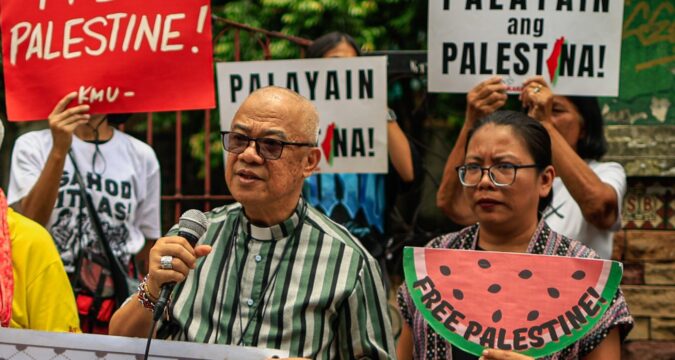
MANILA (LiCAS News): Bishop Gerardo Alminaza of San Carlos and vice president of Caritas Philippines, called for stronger solidarity with indigenous peoples [IPs] and condemned what he described as the country’s ignorance of their cultures, struggles, and rights.
Speaking at the International Day of the World’s Indigenous Peoples forum on August 9 at the Maryhill School of Theology, said the marginalisation of IPs is not due to a lack of awareness but an active choice to disregard them.
“Our problem in Negros is like most of the Philippines, or even the world. It isn’t ignorance—a word with Latin roots meaning ‘not knowing’. We know IP cultures exist. It is ‘ignore-ance,’ or ignoring,” Bishop Alminaza said.
“We ignore—a word that has developed to mean that we intentionally disregard something or someone. We have evolved from a state of not knowing to an active choice of not acknowledging,” the bishop added.
Bishop Alminaza said indigenous peoples remain marginalised as their cultures are disregarded for the advantage, gain, and comfort of the majority.
Our problem in Negros is like most of the Philippines, or even the world. It isn’t ignorance—a word with Latin roots meaning ‘not knowing’. We know IP cultures exist. It is ‘ignore-ance,’ or ignoring
Bishop Gerardo Alminaza
The bishop noted that, globally, there are about 476 million indigenous peoples belonging to 5,000 cultures in over 90 countries—less than six per cent of the world’s population but accounting for at least 15 per cent of the world’s poorest.
In the Philippines, there are 110 ethnolinguistic groups, estimated at around 14 million people, or more than 10 per cent of the population, though the 2020 census had an “error in ethnic identification.”
They are spread across the country, with 63 per cent in Mindanao, 34 per cent in Luzon, and three per cent in the Visayas. On Negros Island alone, at least five ethnic groups are present: the Ati, Ata, Ituman Bukidnon, Magahat Bukidnon, and Carol-anon Bukidnon.
The bishop warned of the impacts of “development aggression and plunder,” citing data from Indigenous Peoples alliance Katribu: nearly half —49 per cent or 449,576.81 hectares—of the total mining projects in the country overlap with or are within ancestral domains.
As we celebrate the 500 years of Christianity in the Philippines. The Chaplaincy to Filipino Migrants organises an on-line talk every Tuesday at 9.00pm. You can join us at:
https://www.Facebook.com/CFM-Gifted-to-give-101039001847033
He said five energy development priority projects under the Marcos administration’s “Build Better More” programme are located within ancestral lands, covering 143,000 hectares. In the Cordillera, 101 hydropower projects are lined up or installed, while other dam projects span the country.
He [Bishop Alminaza] said five energy development priority projects under the Marcos administration’s ‘Build Better More’ programme are located within ancestral lands, covering 143,000 hectares
At least 320,000 hectares of ancestral lands are controlled by large, local, and foreign corporations for monocrop plantations of banana, pineapple, oil palm, bioethanol, and coffee, displacing or adversely affecting Indigenous communities, especially in Mindanao.
Bishop Alminaza also cited a shift in government forestry policy that favours corporations managing up to 40,000 hectares, some overlapping ancestral domains, as well as increasing palm oil plantation agreements such as the one in Candoni, Negros, with Hacienda Asia Plantation Inc. [HAPI].
Tourism projects, he added, also threaten land dispossession—from the Molbog and Cagayanen in Bugsuk, Palawan facing San Miguel Corporation’s luxury resort plans, to the Ayta in Central Luzon against Clark Development Corporation and Bases Conversion Development Authority, and the Ati in Boracay against multiple claimants.
The bishop lamented that many indigenous groups “are ignored as they wait for years and decades to secure their Certificates of Ancestral Domain Titles” and that indigenous representation in local government units often “goes unimplemented.”
Bishop Alminaza also denounced the worsening militarisation in indigenous areas, citing harassment, surveillance, red-tagging, aerial bombings, and the destruction of Lumad schools
Bishop Alminaza also denounced the worsening militarisation in indigenous areas, citing harassment, surveillance, red-tagging, aerial bombings, and the destruction of Lumad schools.
“There are places in the Philippines where rising in resistance is very difficult these days,” he said, pointing to “the control of LGUs [local government unit] by NTF-ELCAC [National Task Force to End Local Communist Armed Conflict]” as one of the factors that “make defending the rights of poor communities very difficult.”
Save Our Schools in Mindanao has reported 21 Lumad schools destroyed, 10 incidents of aerial bombing, and Lumad children criminalised. “This is not just injustice—it is a spiritual wound,” the bishop said.
Despite the challenges, Bishop Alminaza vowed to stand with indigenous communities, particularly those in his home province.
“We will stand with our IP neighbours!” he declared, noting his role as elected chair of the Wisdom Council of the Negrosanon Initiative for Climate and the Environment, which is supporting Magahat farmers in Candoni in their struggle against HAPI.
He called for sustained advocacy for indigenous peoples, environmental defenders, and those facing persecution, emphasizing that solidarity must extend to the red-tagged, the unjustly detained, the disappeared, and their families, and all who protect the environment and defend the land.
He stressed that hope requires discipline, deliberate action, and unity, urging everyone to make marginalised communities visible and to keep working together.










